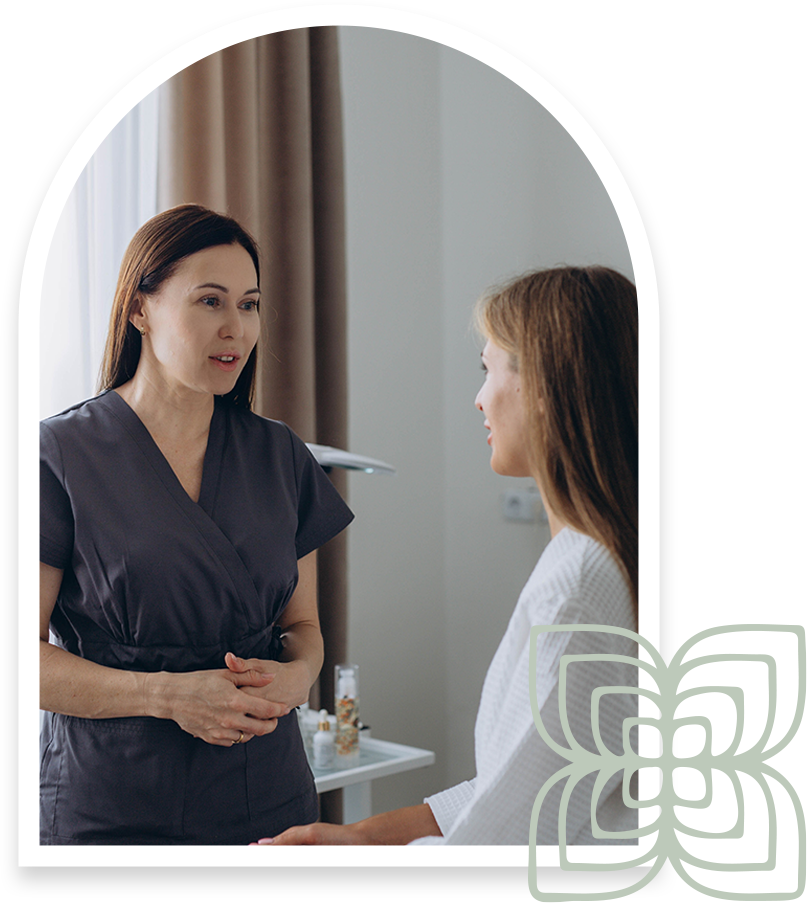Sexual Health GP Services
Are you looking for friendly care and guidance to maintain your sexual health? At Healthy Haven Family Clinic, we’re committed to supporting your overall well-being through tailored sexual health services. From comprehensive STI testing and treatment to personalised counselling, our sexual health clinic in Hoppers Crossing provides a safe, non-judgmental space for all your sexual health needs. With a focus on prevention, education, and tailored treatment, we’re here to help you take control of your sexual health and make informed, confident decisions.
Understanding Sexual Health
Sexual health encompasses more than just being free of disease or dysfunction. It includes having respectful relationships, access to healthcare. Good sexual health is vital for overall well-being, impacting both mental and physical health. It is linked to emotional health and significantly contributes to our quality of life and happiness. This holistic perspective highlights the need to address sexual health in a comprehensive manner.
Achieving and maintaining sexual health requires access to accurate information and safe healthcare services. Knowing the risks of unprotected sex and practicing safe sex methods are crucial. Having the right resources and support can significantly impact your sexual health journey.


Understanding Sexual: Health
Sexual health encompasses more than just being free of disease or dysfunction. It includes having respectful relationships, access to healthcare. Good sexual health is vital for overall well-being, impacting both mental and physical health. It is linked to emotional health and significantly contributes to our quality of life and happiness. This holistic perspective highlights the need to address sexual health in a comprehensive manner.
Achieving and maintaining sexual health requires access to accurate information and safe healthcare services. Knowing the risks of unprotected sex and practicing safe sex methods are crucial. Having the right resources and support can significantly impact your sexual health journey.

Common Sexually Transmissible Infections (STIs)
Sexually transmitted infections (STIs) and sexually transmitted diseases (STDs) are more common than many people realise, predominantly among 15-49 yrs. This includes infections like chlamydia, gonorrhea, syphilis, and trichomoniasis.
Early detection of STIs can help to prevent serious consequences like infertility, certain cancers, and higher susceptibility to HIV. Regular sexual health checks are crucial, particularly for high-risk groups such as sex workers and individuals with multiple partners. Being informed and proactive about sexual health is essential.
Symptoms of STIs
Identifying symptoms of sexually transmissible infections is key for timely diagnosis and treatment.
Common signs include:
- Painful urination
- Unusual discharge from the vagina, penis, or anus
- Lumps or skin growths around the genital area or anus
- Genital itching
Certain STIs can cause flu-like symptoms, complicating diagnosis. Seeking medical advice promptly when these symptoms occur ensures timely diagnosis and treatment. Early intervention can halt the progression of infections and lower the risk of transmission.
Regular STI Tests and Diagnosis
STI screening often involves a simple and non-invasive urine test. Depending on the infection, other tests like urethral swabs, first-pass urine, and vaginal or endocervical swabs may be used, with the latter being more effective for females.
Providing accurate information about your sexual health history when booking a check-up helps to guide the recommended tests. Being open about recent concerns ensures the most appropriate tests are conducted. This proactive approach is essential for early detection and effective treatment.

What to Expect During an STI Test
Getting tested for sexually transmissible infections (STIs) is a straightforward process designed to ensure your comfort and privacy. When you visit a GP, here’s what you can expect:
- Initial Assessment: A healthcare professional will ask you questions to assess your risk of STIs and determine which tests you need. This may include enquiries about your sexual history, such as the number of sexual partners you have had and whether you have used protection.
- Explanation and Consent: Your GP will explain the testing process and answer any questions you may have, ensuring you feel informed and at ease.
- Sample Collection: Depending on the type of STI test required, you may need to provide a urine sample, a blood test, or a swab sample from the throat, anus, or vagina.
- Results and Follow-Up: Test results typically take a few days to come through. You will be contacted to discuss the results and any necessary treatment if you test positive for an STI.
By understanding what to expect during an STI test, you can approach the process with confidence and take proactive steps towards maintaining your sexual health.
Treatment Options
Treatment options for sexually transmitted infections vary depending on whether the infection is bacterial or viral. Bacterial STIs can often be effectively treated with antibiotics, sometimes requiring just a single dose. On the other hand, viral STIs, such as herpes and HIV, are usually managed with antiviral medications that help control the infection but do not cure it.
Opportunistic STI screenings can lead to early detection and treatment, preventing severe health issues like pelvic inflammatory disease and infertility. Adherence to treatment regimens is key to managing and overcoming STIs.
Prevention Strategies
Preventing sexually transmitted infections requires safe sex practices and healthcare measures. Using external latex condoms promotes mutual consent and respect while significantly reducing the risk of HIV transmission. Internal condoms offer an alternative method of protection, allowing the receptive partner to take control of prevention.
Vaccination is another important strategy. The HPV and Hepatitis B vaccines are highly recommended for sexually active individuals, especially those with multiple partners, as they provide significant protection. Male circumcision has also been found to lower the likelihood of HIV acquisition and reduce the risk of other STIs in heterosexual men.
These prevention strategies, along with regular sexual health checks, form a robust defense against sexually transmissible infections.


Prevention Risk Factors for STIs
Certain factors can increase your risk of contracting a sexually transmissible infection (STI). Being aware of these risk factors can help you take preventive measures and make informed decisions about your sexual health:
- Multiple Sexual Partners: The more sexual partners you have, the higher your risk of contracting an STI. Regular STI tests are crucial if you have multiple sexual partners.
- Not Using Protection: Failing to use condoms or other barrier methods during sex significantly increases your risk of STIs. Always use protection to reduce the risk.
- New Sexual Partner: If you have a new sexual partner, it’s essential to get tested for STIs to ensure you are both safe. Open communication about sexual health with your partner is key.
- High-Risk Behaviors: Engaging in high-risk behaviors, such as sharing needles or having unprotected sex with someone who has an STI, can increase your risk. Avoiding these behaviors is crucial for your sexual health.
Understanding these risk factors and taking preventive measures can help you maintain a healthy and safe sexual life.

Addressing Stigma and Myths
Addressing the stigma and myths surrounding sexually transmitted infections is crucial for encouraging individuals to seek care. Societal shame and embarrassment often lead to avoiding discussions about sexual health, perpetuating stigma. Open and unbiased communication about sexuality is essential in combating this stigma and promoting healthy sexual practices.
Routine screenings can help normalise discussions about sexual health, reducing stigma and encouraging individuals to seek necessary care. counselling services offer a safe environment to discuss sexual health concerns without judgment, further reducing stigma.
Support and counselling
Support and counselling are essential for individuals dealing with sexually transmitted infections. Many patients find relief in discussing their sexual health concerns with a supportive professional.
Counselling services can be very effective when it comes to navigating the emotional and psychological challenges associated with STIs. Access to a friendly team of professionals can significantly impact managing sexual health concerns and ensuring overall well-being.
Confidentiality and Accessing Our Service
At our sexual health clinic, we prioritise your privacy and confidentiality. We understand the sensitive nature of sexual health information and ensure that all details about you are kept private and secure:
- Privacy Assurance: Our staff will maintain your privacy when requesting information, ensuring a respectful and confidential environment.
- Restricted Access: Only those involved in your care will have access to your medical information.
- Secure Storage: Your information will be stored securely, ensuring it is protected at all times.
- Inclusive Services: We provide care and support to individuals who require it, including those who may not speak English.
Your confidentiality is our priority, and we are committed to providing a safe and supportive environment for all your sexual health needs.


Confidentiality and Accessing Our Service
At our sexual health clinic, we prioritise your privacy and confidentiality. We understand the sensitive nature of sexual health information and ensure that all details about you are kept private and secure:
- Privacy Assurance: Our staff will maintain your privacy when requesting information, ensuring a respectful and confidential environment.
- Restricted Access: Only those involved in your care will have access to your medical information.
- Secure Storage: Your information will be stored securely, ensuring it is protected at all times.
- Inclusive Services: We provide care and support to individuals who require it, including those who may not speak English.
Your confidentiality is our priority, and we are committed to providing a safe and supportive environment for all your sexual health needs.
Frequently Asked Questions


